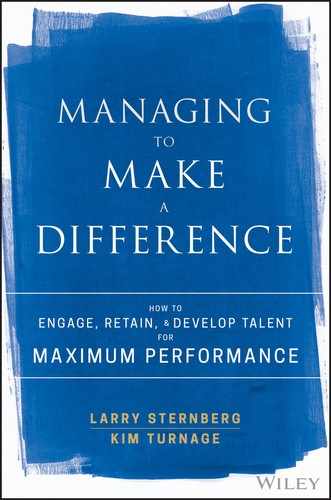Chapter 63
Encourage Suggestions
Have an Appetite for New Ideas
When employees make suggestions, it is a strong indication they are thinking! They are bringing their brains to work. Given the relentless rate of change in the world today, no organization can afford to have employees at any level who merely do what they are told. We all need people who bring their brains to work, and we need to foster cultures that have an appetite for new ideas.
Most of us (probably all of us) care where a new idea comes from. If it comes from someone we see as a respected authority on the topic, we immediately believe the idea is worthy of serious consideration. If it comes from a 21-year-old, brand-new employee we might not give it as much weight. Or, God forbid, it comes from a new hire who just joined us from a competitor. In that case, we might even be very defensive. To what extent should the where or the who influence how we respond to an idea?
In many organizations, experienced new hires attract criticism when they say, “In my former company we did X, and it worked really well.” If that new hire came from a highly successful company, they might discuss their former company frequently, particularly just after they come on board. For some reason, many managers find this annoying. Sometimes, in fact, these new hires are told to stop mentioning their former company.
Why not welcome these statements? When managers make people feel like these statements are unwelcome, they are shutting out opportunities to learn. Do you think that you have nothing to learn from other organizations? These new hires are sharing best practices (or at least practices that are better than the ones they are seeing in your organization). What is the danger? Where is the harm?
Not only should you welcome these ideas, you should give them serious consideration. Reject fear-based responses, and do not immediately dismiss these ideas as, “Not a fit with our culture.” Also, be careful about making another common response: “We tried that before. It did not work.” Do responses of that sort encourage more suggestions? Do they contribute to learning? The answers are, “No,” and “No.”
Think of it this way. Suppose you are just walking down the street and find an idea written on a piece of paper. You are with a couple of associates who work with you. There is no way to know who or where this idea came from. Some of you immediately think the idea is worth pursuing, and some of you do not. Your only course of action is to discuss it on its merits. When someone makes a suggestion, that moment is an opportunity for learning, both for the employee and for the manager. Do Not Waste It!! Discuss these ideas on their merits. In fact, why not give them a try?
Is your initial reaction to search for flaws? Instead of giving an unsupportive, knee-jerk response, why not give a supportive, knee-jerk response? Here is an example: “Thanks for thinking about ways we can improve. When can we get together to discuss it more? I want to understand more about how you think this will make us better.” If you do not have time now, get out your calendar and make an appointment.
All ideas and all strategies have drawbacks and benefits. The process of discussing and evaluating a suggestion will allow those possible consequences to emerge through discovery. This is how learning occurs.
Equally important, the process conveys that you view the person as worthy of your time. By engaging authentically in this evaluation process, no matter what the outcome, you encourage more ideas, not only from that employee, but also from others (because your people are paying close attention).
One final point. Among other things, leaders are people who have ideas for improvement. Could the employee who frequently brings you ideas for improvement be a future leader?
